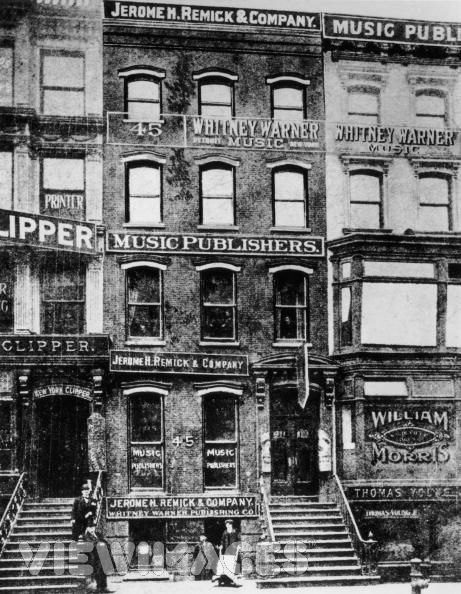The birthplace of the modern music industry, Tin Pan Alley was
located on Twenty-Eighth Street between Fifth and Sixth avenues in Manhattan,
New York. The buildings were built circa 1852 and 1853, but it did not become
the center of popular music until around 1883 or 1885.
After the Civil War, pianos became more common and as a result,
children began learning the piano making the demand for sheet music higher.
Publishing companies purchased the rights for the sheet music and mass produced
copies to sell on the market, making sheet music more accessible, leading to
more interest in instrumental music. The increased attraction to musical
instruments sparked by popular songs and mass produced sheet music led to
multiple music shops being opened on Tin Pan Alley to cater to these interests.
“Tin pan” refers to the sound of the many pianos being
pounded on in the demo rooms of publishers and music stores by song-pluggers,
creating the noise similar to that of people banging on tin pans, which is how
Tin Pan Alley got its unique name. The phrase “Tin Pan Alley” can refer to any
area within a major city in which exists a good number of music stores and
music publishing locations; however the one referred to upon in Against the Day
is the one located in New York city. Song-pluggers were musicians hired to
promote the sales of sheet music in stores or on the road.
The time between 1860 and to the early 1920’s was considered to be
an innovative time in music history. Artists in Tin Pan Alley began with
ballads and comedic songs, but soon they became engrossed by cakewalk and
ragtime music before delving into jazz and blues. A few popular pieces
are “After the Ball” (1892) by Charles K. Harris, “The Little Lost Child”
(1894) by Marks & Stern, and “Take Me Out to the Ball Game” (1908) by
Albert Von Tilzer.
On June 11, 1895, music publishers in Tin Pan Alley gathered
together to form the Music Publishers Association to lobby for the Treloar
Copyright Bill that would increase the music copyright term from 24 years to 40
and allow the copyright to be renewable for20 additional years instead of 14
years, however it was unsuccessful. In 1914, the American Society of Composers,
Authors, and Publishers (ASCAP) was found to protect the interests and rights
of composers and publishers.
After the flourishing of musical talent in Tin Pan Alley came the
turmoil of World War I and The Great Depression. At this time, rock and roll
became more popular as Elvis Presley recorded his first album and the invention
of the gramophone made listening to music more accessible. Around 1954, Tin Pan
Alley’s popularity reached an end and its music stylings became nothing more
than a piece of music history.
Relevance to Against the
Day
In Against the Day, Dally, while aspiring to become an actress, is
approached by R. Wilshire Vibe who is interested in having Dally act on his
latest production. On page 342, attracted by the idea of performing on
Broadway, Dally goes to R. Wilshire Vibe’s office centered in Tin Pan Alley to
negotiate a deal. Pynchon describes it as sounding like an orchestra of saloon
pianos, which at the time when pianos were more common and cheaper to purchase,
it might just have sounded so. R. Wilshire mentions how the playing continues
on night and day, without a single piano in tune, which I believe must have
been caused by the multitudes of different songs being played within a single
moment, all straining to be heard against the rest of the clamoring. The pianos
were also made out of cheaper materials at the time which may have contributed
to its sound.
On page 399, the Chums of Chance come across a small house band in
which exists a “tin pan piano.” The term “tin pan” is coined to describe the
sound of Tin Pan Alley as being out of tune, which may insinuate that the piano
was out of tune at the time as Tin Pan Alley must have sounded with all of the pianos playing at the same time.
Throughout the book, we also see that the characters burst into
nonsensical songs about the strangest subjects. I believe that this is caused
by the influence that music had at the time and the attraction people had
towards music. Due to the increase in interest in music, characters like those of the Chums of Chance must have felt this desire to suddenly burst into silly songs as they gather as a group and relax. Musical instruments like the ukulele are brought up quite often
as well, which leads to the thought that people are curious about learning
instruments as was caused by the increased availability to sheet music at the
time. The mass production of sheet music helped to make it possible for people to learn a new instrument.
Sources:
http://parlorsongs.com/insearch/tinpanalley/tinpanalley.php
http://www.buzzle.com/articles/tin-pan-alley-history.html
http://en.wikipedia.org/wiki/Tin_Pan_Alley
http://www.thegoldenstreetcorner.com/tin_pan_alley.htm
http://parlorsongs.com/insearch/tinpanalley/tinpanalley.php



No comments:
Post a Comment